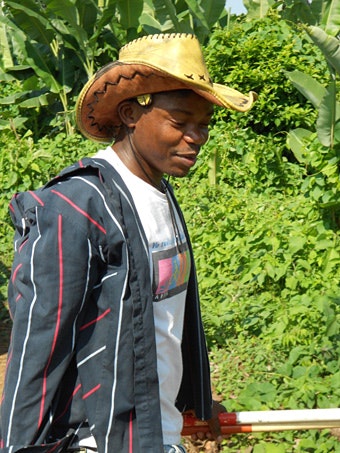Feeding the Land to Fight Hunger in Mozambique
By Chuck Sudetic

In 2009, the Open Society Scholarship Programs awarded EARTH University a grant to support promising undergraduate scholars from Haiti and Mozambique. The following post is part of our blog series featuring their voices.
Sergio Augusto Quiroz: I have known hunger. I grew up on a farm in Zambizia, a region in the center of Mozambique. I have three brothers and one sister, and there were three orphaned cousins who lived with us in a village an hour’s drive from the nearest town by car, motorbike taxi, or minibus, and two days by bus from Maputo. My father died in 1984, when I was two years old. He was a soldier. A land mine exploded under the truck he was driving. My family has no land nearby, and my mother still works fields for three farmers. She taught me when I was twelve years old how to work the fields. I’ve planted corn, rice, cassava, and peanuts. Our food and money came from the farmers and whatever odd jobs my mother found.
My mother had an accident and was hospitalized for three years. We children were left alone. Some priests gave us land to build a house and grow some food. Sometimes we fed ourselves by eating the leaves of bean plants. We would harvest cassava and take it to market to try to sell, to be able to purchase a little more food and school supplies. I was the youngest of my siblings. I managed to finish school and became the first member of my family to attend university. After graduating, I started working with World Vision. With that money I took care of myself and my brother and sisters who were still in school. My mother now has an association with about twenty other widows whose husbands died during the war or due to accidents, AIDS, or TB. They work the fields and do any other jobs they can find for money.
I had a friend who attended EARTH. He told me to apply. Where I live there is no Internet. So I sent the documents with a friend to Maputo and he submitted it over the Web. I had an interview with an EARTH professor in Nampula, in the North, about twenty hours away by bus. There were nineteen candidates. They selected two.
At EARTH, I have learned many things. When I go back to Mozambique, I want to change the thinking of people who live in villages. I know the people who work the fields. I know they do not have knowledge or techniques that would allow them to draw more from the land and take better care of it. They engage in itinerant agriculture: clearing wild fields, planting and harvesting season after season, until the land becomes weak and is abandoned. They do not rotate the crops. This year, corn; next year, corn; all the time, corn. It is difficult to change their ways. They are very conservative. They believe it is too great a risk—of crop failure and hunger—to change the way they do things.
One of the systems I want to take back is the circular mandala system, which produces animal protein, vegetables, and carbohydrates: everything for rapid consumption in the family. There is a lot of potential for this in communities in Mozambique. They have the space, and the water. The nucleus of the mandala is a pond with fish and round pen for ducks. Around the nucleus, in the first circle, are vegetables and other crops that need the most water. Second circle, has crops that are heavily consumed and need less water. Around this grow circles of corn and peanuts or whatever is the principal crop in the area. It is an efficient system. Families can produce all the basic food they need very close to home, instead of having to walk long distances to their land.
As told to Chuck Sudetic.
Until November 2013, Chuck Sudetic was a senior writer for the Open Society Foundations.